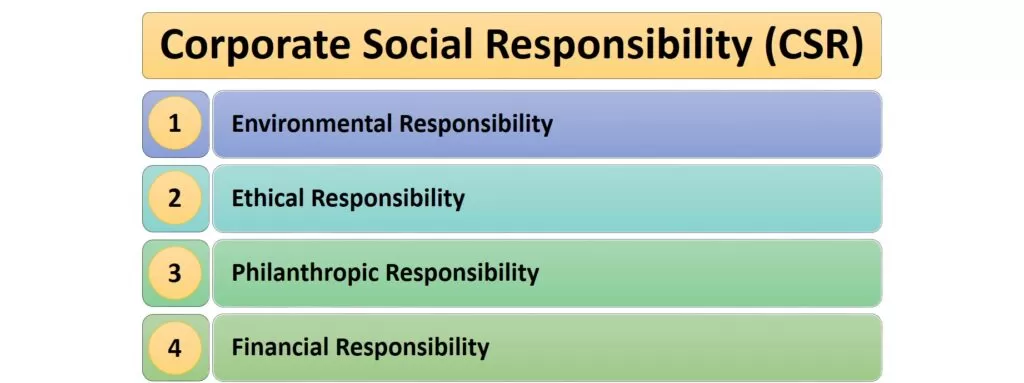Corporate Social Responsibility-CSR is the mandatory customer requirement that is to be fulfilled by every supplier engaged in the field of automotive, manufacturing & service sectors.
A company that practices corporate social responsibility makes a deliberate effort to conduct its operations in a way that benefits society and the environment rather than harming them.
Corporate social responsibility may help to improve society and promote a good brand image for organizations.
The CSR Requirements for suppliers are listed below section-wise.
Table of Contents
Management Commitment
- Internal Occupational Health & Safety, Environmental Safety Audits
- Environmental Health & Safety (EHS) Procedure
- Environmental Health & Safety (EHS) Policy – must be available, displayed & communicated to all interested parties.
- Employee Satisfaction Survey- Staff & Workers
- Code of Conduct
- Anonymous report channel
Health & Safety
- Occupational Health & Safety Management System Certification (ISO 45001).
- Key Performance Indicators – OH&S.
- Occupational Health and Safety Risk Assessment (HIRA Study).
- OH&S Risk Mitigation & Monitoring.
- PPE (Personal Protective Equipment).
- Machine/Working Environment Safety- Machines with safety curtains and protections.
- Emergency Preparedness Plan/ Fire Mock Drill.
- Ergonomics (Like Weight lifting, Movement, etc.).
- Special Operation (for example- Height, Electrical, Forklift, Welding, etc.).
- In-house traffic- Clear gangways, No invisible corners, Forklift equipped with sirens and alarm.
- Visitor Safety Guidelines/Policy – must be displayed at the main gate entrance.
- Living conditions- e.g. Shop floor toilet for regular & contract employees.
- First Aid – Training & first aid boxes are available at respective areas/sections.
- Occupational Health & Safety Training.
Environment
- Environmental Management System Certification (ISO 14001)– This standard aims to protect the environment from Air, Water & Land pollution.
- Key Performance Indicators – EMS (Environmental Management System).
- Environmental Risk Assessment.
- EMS Risk Mitigation plan & monitoring.
- Chemical and Hazardous Materials Handling & Storage.
- Use of Restricted Substances and Minerals.
- Air, Water & Noise testing & monitoring.
- Hazardous Waste disposal system.
Human Rights & Business Ethics
- Hiring- hiring period & notice period.
- Working hours- As per government norms 60 hours/week (as per new regulations).
- Compensation – Overtime compensation, ESI/PF/LW contribution.
- No Child Labour.
- No Forced Labour.
- Corruption and Bribery – ABAC (Anti-Curruption Ant-Bribery) training & policy.
Supply Chain Management
- CSR (Corporate Social Responsibility) requirements for suppliers.
- CSR requirements communication to supplier.
- Environmental Health & Safety (EHS) for Subcontractors (construction, canteen, cleaning, etc.). Proper PPEs for all subcontractors.
Types of CSR | Corporate Social Responsibility
- Environmental Responsibility
- Ethical Responsibility
- Financial Responsibility
- Philanthropic Responsibility

Environmental Responsibility
Environmental preservation is the foundation of corporate social responsibility. Reducing manufacturing pollution and emissions, recycling materials, restocking natural resources like trees, or developing product lines that align with corporate social responsibility are all ways that a business can practice environmental stewardship.
Ethical Responsibility
CSR includes acting fairly and ethically. Fair treatment of all consumers, irrespective of their age, color, culture, or sexual orientation; competitive wages and benefits for staff; vendor use across demographics; complete disclosures; and openness for investors are all examples of ethical responsibility.
Philanthropic Responsibility
CSR demands an organization to contribute to the community, whether it means supporting employee philanthropic initiatives, donating profits to charities, only doing business with suppliers or vendors who share the company’s values, or sponsoring fundraising events.
Financial Responsibility
A business may decide to focus on environmental, ethical, and philanthropic issues, but it must support these plans with funding for programs, donations, or product research. This includes developing products that promote sustainability, hiring a diverse workforce, or putting DEI, social awareness, or environmental initiatives into action.
You’ll also like:
- Sustainability 3 Pillars | Sustainability Examples | Goals
- Sustainability Development Goals | Pillars | Examples
- Substance of Concern Management System | SOC Check Sheet
- Substances of very high concern reach | SOC
- Environmental Management System EMS | ISO 14001 standard
